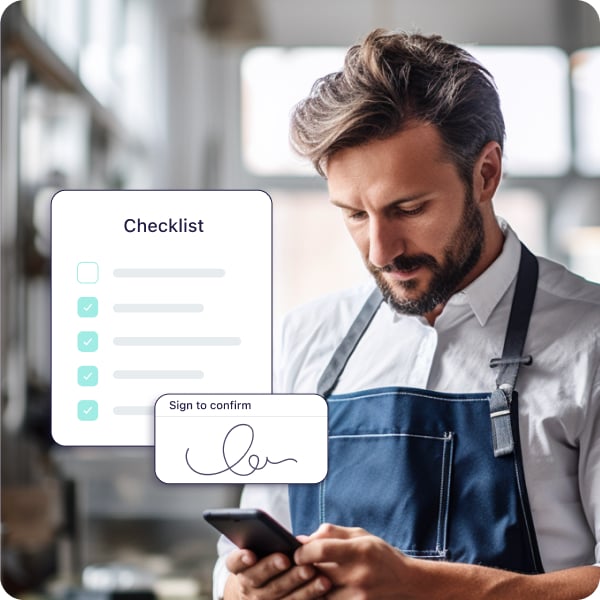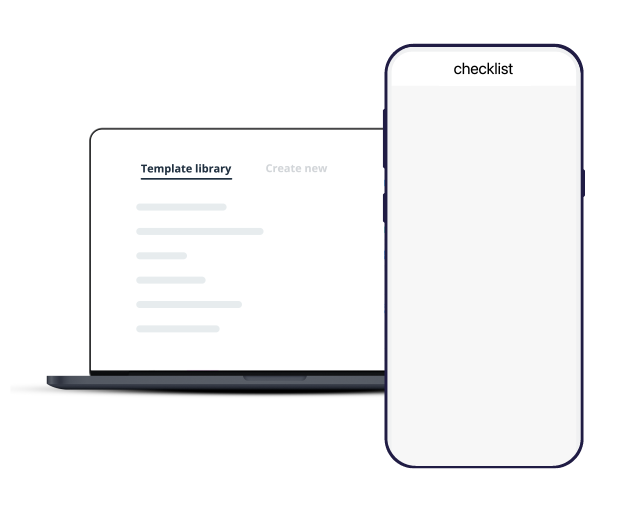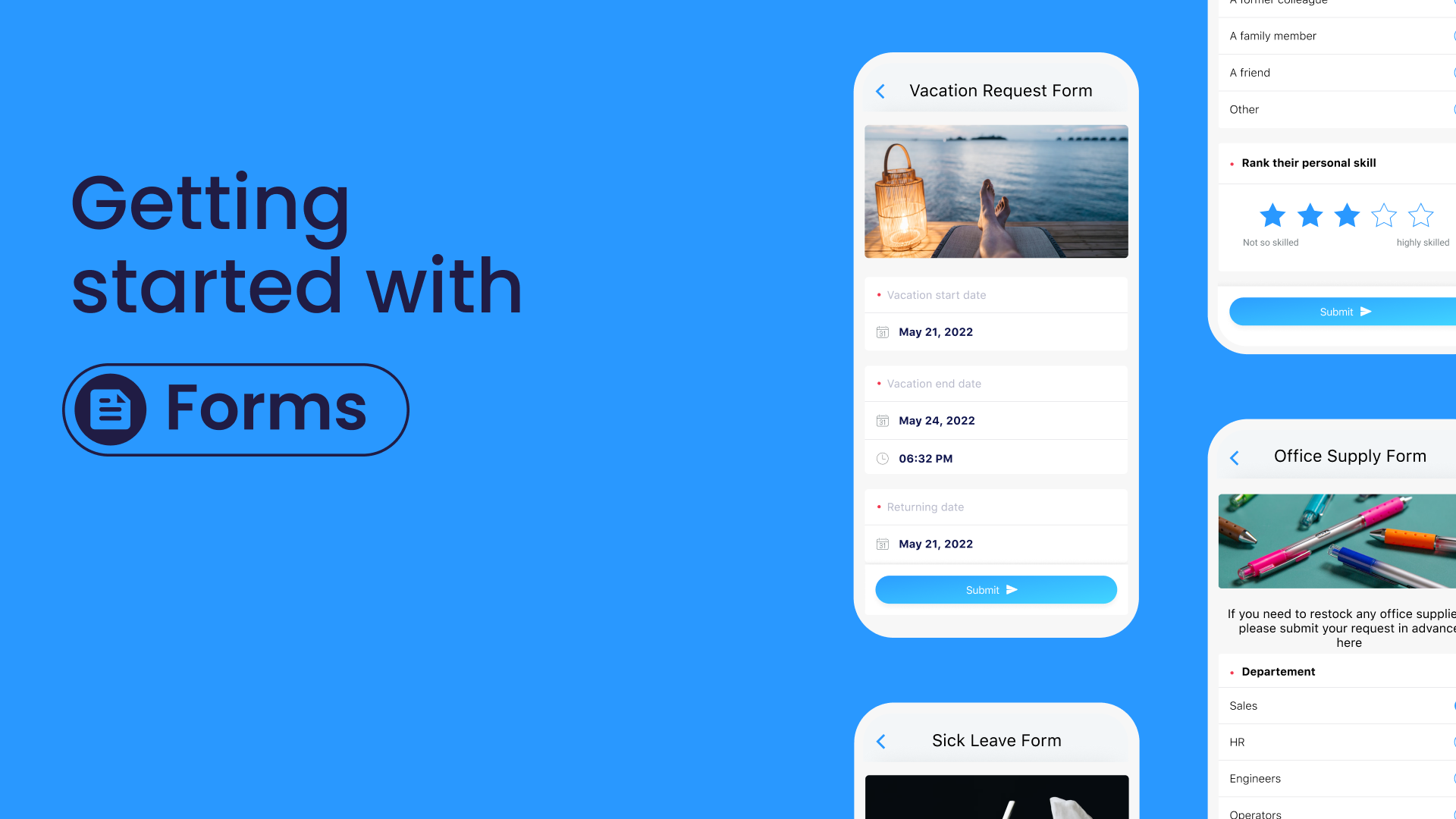Use our harness & lanyard inspection checklist template as a starting point to customize yours to fit your company.
Harness & Lanyard Inspection Checklist Template

Make work flow with Connecteam’s digital forms & checklists
- Easily create digital forms and checklists for any task your team needs to complete on the job
- Boost accountability by having employees add a signature, image, or location stamp
- Save time by choosing from a variety of ready-made templates
- Instantly receive your team’s submissions and share reports within your organization
- Use AI to convert PDFs, Excel files, or images into digital forms in seconds—no manual work needed

Harness & Lanyard Inspection Checklist Template
Regular inspection of safety harnesses and lanyards is crucial to ensure the safety of individuals working at heights.
The Harness & Lanyard Inspection Checklist is designed to guide safety professionals and workers through a systematic examination of harnesses and lanyards.
By following this checklist, you can identify and address potential issues, ensuring the integrity of fall protection equipment.
Harness & Lanyard Inspection Checklist:
Equipment Information:
[ ] Equipment Type: Specify whether it’s a harness, lanyard, or other fall protection gear.
[ ] Serial Number: Record the unique identifier for the equipment, if applicable.
[ ] Date of Manufacture: Note the date when the equipment was manufactured.
General Inspection:
[ ] Visual Inspection: Examine the entire harness or lanyard for signs of wear, damage, or contamination.
[ ] Labels and Markings: Check for legible labels, tags, and manufacturer markings.
[ ] Hardware: Inspect all hardware components, such as buckles, D-rings, and connectors.
Harness Inspection:
[ ] Webbing: Examine webbing for fraying, cuts, abrasions, or signs of chemical damage.
[ ] Stitching: Inspect stitching for loose threads or broken seams.
[ ] Straps and Adjustments: Ensure all straps are secure and adjusters function correctly.
Lanyard Inspection:
[ ] Webbing: Examine lanyard webbing for wear, cuts, or abrasions.
[ ] Energy Absorber: Inspect the energy-absorbing pack (if applicable) for damage or deployment.
[ ] Snap Hooks and Connectors: Check snap hooks for proper functioning, wear, or damage.
Functional Testing:
[ ] Buckles and Adjusters: Test buckles and adjusters to ensure they engage and hold securely.
[ ] Shock Absorption: If applicable, verify that the shock absorption feature is functioning.
Cleaning and Maintenance:
[ ] Cleanliness: Ensure the equipment is clean and free of dirt or contaminants.
[ ] Lubrication: Lubricate moving parts if recommended by the manufacturer.
Documentation:
[ ] Inspection Records: Document inspection date, findings, and actions taken.
Retirement Criteria:
[ ] Age Limit: Determine if the equipment has reached its recommended retirement age.
[ ] Damage Threshold: Establish criteria for when the equipment should be retired due to damage.
Task Review:
[ ] Verify Completed Tasks: Review the checklist to ensure all inspection tasks are completed.
[ ] Update Equipment Records: Update equipment records based on inspection findings and actions taken.
Supervisor/Manager Approval:
Signature of approving supervisor/manager
Signature: _________ Date: _________
The Harness & Lanyard Inspection Checklist is a vital tool for ensuring the safety of individuals working at heights.
By following this checklist, you can identify and address potential issues in fall protection equipment.
Customize the checklist to match the specifics of your equipment and use it as a foundation for regular inspections.
By adhering to this checklist, you contribute to a safer working environment and the protection of individuals working at elevated locations.
Choose Connecteam, the #1 Choice for Safety Inspectors
Connecteam is the ultimate tool that can significantly enhance your performance, streamlining your tasks and boosting productivity.
With our user-friendly mobile app, you can easily create and access equipment inspection checklists, ensuring every aspect of the project is thoroughly examined.
Empower yourself with our real-time reporting feature, allowing you to document findings instantly, complete with photos and notes, and enabling efficient communication with project managers and stakeholders.
Plus, our smart staff scheduling and employee task management capabilities help you optimize work plans, ensuring timely inspections and minimizing delays.
Experience a game-changing solution tailored to your construction company’s needs!
📚 You might be interested in reading:
- The top employee tracking apps for 2026
- The best clock in clock out app of 2026
- The best employee scheduling apps of 2026
Get started with Connecteam for free today and enjoy seamless checklists, instant reporting, and efficient collaboration with your team.
Watch the video below to see it in action:

Ready to boost your efficiency with our pre-made templates?